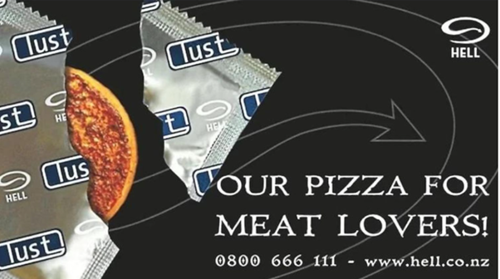IP and Marketing Law Christmas Crackers 2024

As we head into the silly season, it is time to look back on some of the unusual and interesting intellectual property and marketing law news that hit the headlines in 2024.
New Zealand Transport Agency gets revved up over vehicle number plates
The New Zealand Transport Agency (NZTA) has reportedly revoked 46 personalised vehicle number plates it has deemed offensive over the past year, including eyebrow-raising plates like VIOL8U, FJCK, M0FO, JIZZUM, and P PIPE.
The controversial plates, many of which were flagged to the NZTA by anonymous complainants, sparked debate about what is acceptable in the world of personalised plates. Plates like H8WIFE, SPLIF and NUTZAC were allowed to remain, while others with more questionable connotations were removed from circulation. NZTA’s decision-making process was put under scrutiny, leading to a review aimed at improving consistency and reducing frivolous complaints.
In one instance, the NZTA reportedly wrote to the owner of the plate for NUTSAX to notify them that the plate must be forfeited. The owner of the plate argued in response that he used it to raise awareness about testicular cancer - the plate was fixed to his car along with stickers above it, reading together “CHECK YA NUTSAX!”.
The owner of the NUTSAX plate received hundreds of supportive comments on social media. The Minister for Regulation even weighed in by writing to the Minister for Transport, remarking that “the balls are very much in your court on this one” and asking the Minister for Transport to “please demand your officials revisit this testy decision”.
In a win for common sense (and for creative free speech), the NZTA decided to allow the NUTSAX plate to remain rather than letting the issue hang.
Meanwhile, we are yet to see applicants taking such a bold approach with trade marks, but it will be interesting to see whether the Intellectual Property Office would also take such a pro-freedom of speech approach to an application for, say, NUTSAX. Certainly, in the balancing of ‘offensiveness’ v ‘openness’, the pendulum in New Zealand is starting to swing…
No pain, no grain
The Government of India has failed in an attempt to register BASMATI in New Zealand as a certification trade mark for rice. The trade mark applicant, the Indian Government’s Agricultural and Processed Food Products Export Development Authority, argued that the name BASMATI had a long history with India dating back at least 200 years, and that basmati rice had a number of distinctive characteristics.
However, a decision by the Assistant Commissioner of Trade Marks found that the name BASMATI was not capable of distinguishing rice products bearing a BASMATI certification mark from other rice products. The Assistant Commissioner found that the term basmati was known as a particular kind of rice grown within a region that included both India and Pakistan, and that this was supported by the applicant’s own evidence. The BASMATI name therefore lacked sufficient distinctiveness to act as a certification trade mark.
While the decision is a set-back for the Government of India, the trade mark application remains pending, so it is yet to be seen whether an appeal is filed. We look forward to seeing whether there is evidence that basmati is outstanding in its field.
That’s all I can stands, ‘cause I can’t stands no more!
In a battle of fast food, a Manawatū takeaway shop reportedly dropped its trading name after a spicy legal letter from US fast-food titan Popeyes Louisiana Kitchen.
Popeyes Louisiana Kitchen, the fried chicken heavyweight with over 2,700 restaurants around the world, has a trade mark registration for POPEYES in New Zealand dating back to 1976. However, Popeyes Louisiana Kitchen only opened its first restaurant in New Zealand this year.
Popeyes Louisiana Kitchen’s lawyers wasted no time ruffling feathers amid the New Zealand opening, reportedly sending a cease-and-desist letter to the owners of Popeye’s Takeaways, a fish and chip shop in Manawatū. Popeye’s Takeaways had been trading for at least 30 years and bore images of the famous cartoon character, Popeye, in its shop branding.
Although Popeye’s Takeaways did not sell fried chicken, and despite what looked to be a weak claim by Popeyes Louisiana Kitchen, the shop acceded to the demands of Popeyes Louisiana Kitchen, and has since changed its name to the less-characterful North Street Takeaways.
Much like the cartoon, a Popeye has emerged victorious, but we wonder if the outcome might have been different if the economic playing field had been more even, or if the other party got their hands on some spinach.
The ASA’s golden jubilee of keeping it clean (mostly)
New Zealand’s Advertising Standards Authority (ASA) recently celebrated 50 years of self-regulating the ads that fill our screens, billboards, and online feeds. The ASA has been a referee for responsible advertising, offering a free complaints process for consumers and setting the rules to keep things honest, decent, and mostly drama-free. In recognition of the ASA’s milestone, the ASA’s annual report revealed the top five advertisements it received the most complaints about since the ASA was established. Counting down from number five…
5. Toyota Television Advertisement, 1999 - 120 complaints, not upheld
This iconic Toyota Hilux television ad featured various mishaps on a farm with the repeated use of the word “bugger”, including by a dog.
The ASA Complaints Board ruled the advertisement was unlikely to cause serious and widespread offence considering the humour and adult audience.

The (cute and inoffensive) farm dog that famously uttered the word “bugger” in Toyota’s 1999 ad
4. Waves NZ Billboard Advertisement, 2018 - 146 complaints, upheld
A billboard ad by Waves NZ, an anti-vaccination lobby group, depicted a man holding a baby, with the statement “If you knew the ingredients in a vaccine, would you RISK it?”. Complainants were concerned that the ad was not socially responsible, implied vaccines are not safe, and exploited fear in vulnerable audiences. Waves NZ responded that it was intended to promote informed consent and to encourage parents to do their own research about vaccinations.
The ASA Complaints Board upheld the complaints, noting a lack of advertiser identification and insufficient substantiation.
3. Hell Pizza Billboard Advertisement, 2011 - 178 complaints, not upheld
A billboard advertising Hell Pizza’s limited edition Hot Cross Buns included the text “For a limited time. A bit like Jesus.” Complainants were concerned the ad constituted spiritual abuse, was grossly offensive, and made a mockery of the Christian faith.
The ASA Complaints Board did not uphold the complaints, noting that, while provocative, the ad had a degree of dark humour and in light of prevailing community standards was not likely to cause serious or widespread offence.
2. Open Polytechnic Radio Advertisement, 1997 - over 550 complaints, resolved
This radio advertisement by Open Polytechnic, a tertiary education institute, included the statement “Why, without a brain, you’d be nothing but an oversized novelty paper weight or, worse still, a country line dancer”.
Complaints included a petition signed by about 560 people, which expressed concern that the ad conveyed that line dancers “are nothing more than a lot of brainless morons”.
The advertiser defended the advertisement based on its target youth market and the ad’s humour, but expressed regret at any offence caused and withdrew the advertisement. The ASA Complaints Board considered the matter had been resolved because the advertisement had been withdrawn.
1. Hell Pizza Direct Mail Advertisement, 2006 - 685 complaints, upheld
And the most complained-about advertisement was another Hell Pizza special, this time a campaign for its Lust pizza. The print advertisement, delivered to over 170,000 mailboxes, included a “Hell” and “Lust” branded cardboard wallet containing a condom, instructions for use, and bearing the phrase, “Our pizza for meat lovers!”.
Concerns by complainants included offensiveness, poor taste and decency, the undermining of family values, and the risk of the condom being damaged in the form of packaging.
The Complaints Board found the advertisement had not been placed with a due sense of social responsibility, noting the use of a condom to promote a food product through a method of unsolicited, unaddressed delivery would be likely to cause serious and widespread offence in a number of communities.
So notorious was the marketing stunt that (thankfully, unused) examples of Hell Pizza’s “Lust” condoms are held in the Te Papa Museum of New Zealand’s historical condom collection. We expect that the collection is well-protected.

An image from Hell Pizza’s Lust pizza advertising campaign
Until Next Year
We wish you a safe and happy festive season!








